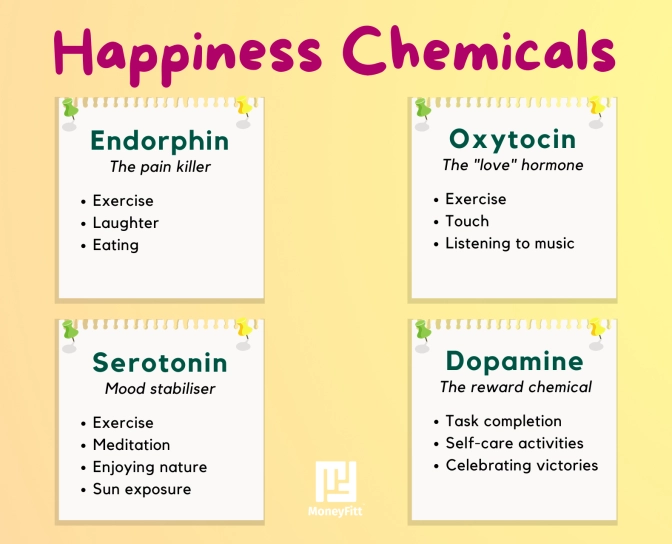Exercise and Depression: How Exercise Can Cure Depression
After all, there’s no harm in getting into good habits!
- Overwhelming evidence suggests exercise can be a vital tool in curing depression or work well as a complementary treatment with therapy or drugs.
- Neuroscientist Dr. James Blumenthal's 2000 study suggests that a persistent exercise routine is as effective in curing depression as antidepressant medications. The rate of relapse of depression was halved for every additional 50 minutes of exercise each week.
- Unfortunately, one of the symptoms of depression is low motivation. If you’re struggling with depression, it can be challenging to motivate yourself to keep up an exercise routine consistently, so scroll down for our top hacks to stay motivated. However, the most critical thing to remember in such cases is not to feel guilt.
Seeking professional support
Depression can be a serious illness. A good rule of thumb is as follows: If your depressed mood lasts over two weeks, or is badly interfering with your ability to work, with your family, and in your social life, or is causing you to consider or plan to commit suicide, it would be sensible for you to consult with a mental health professional immediately.
If you feel severely suicidal and will commit suicide within hours or days unless you receive relief, take yourself directly to your local hospital emergency room and inform them that you are suicidal. In such a case, there is no time to waste.
Depression is depressingly common
One in six people worldwide will experience depression at some time in their life, with women twice as likely as men to have experienced it. Rates have shot up by 25% during the pandemic (where, incidentally, a US study shows that having savings of less than $5,000 increases the risk.) So it's pretty likely that you or someone close to you may suffer from depression.
If you go to your local doctor, they’ll likely prescribe antidepressants or recommend psychotherapy when treating depression. And while sure these treatments indeed work, local doctors generally ignore the link between exercise and depression. Overwhelming evidence suggests exercise can be a vital tool in curing depression or work well as a complementary treatment with therapy or drugs.
However, exercise and other cognitive-behavioural therapies are still usually shunted away in favour of more straightforward and expensive drugs and therapy despite the other numerous health benefits gained by people who exercise regularly. For those who are physically able to, exercise is an excellent natural treatment for curing depression.
How exercise affects depression
When you exercise, your heart rate increases and blood is pumped into your muscles and brain. This increases the oxygen, glucose, vitamins, amino acids, minerals, and other vital nutrients going to your brain. Nerve cell connections are strengthened and created, strengthening different brain regions and memory. Better circulation in your brain also helps speed the disposal of the things the brain doesn’t need, like carbon dioxide, toxins and metabolic waste products.
And the best bit is that all this also activates your inborn reward system, releasing natural feel-good neurotransmitters such as endorphins and serotonin, reducing stress and contributing to the euphoria or ‘high’ you feel after a good workout.

Overall, the benefits of exercise are numerous, both physically and mentally. Interestingly though, studies indicate a strong correlation between exercise and curing depression. A study by neuroscientist Dr. James Blumenthal suggests that a persistent exercise routine is as effective in curing depression as antidepressant medications. The rate of relapse of depression was cut in half for every 50 minutes of exercise added each week.
"One of the positive psychological benefits of systematic exercise is the development of a sense of personal mastery and positive self–regard, which we believe is likely to play some role in the depression–reducing effects of exercise." - (Dr James Blumenthal, 2000)
Other studies have had similar findings regarding the efficacy of exercise routines and therapy in curing depression.

Moreover, research indicates that you don’t need to wait too long to see the results. A study found that walking on a treadmill for 30 minutes a day for 10 days was linked to curing depression. Could you find 30 minutes a day to go walking? The emotional benefits are even greater if you do it outdoors, especially in nature, besides burning more calories and strengthening different muscles!
Finally, research has found that the gains made by exercise for curing depression may be longer-lasting than those caused by antidepressants and psychotherapy. When exercise is used to cure depression, there is shown to be lower chances of relapse, and the benefits persisted for well over a year. In the Blumenthal study, the effect of exercise (without medication) was far longer lasting than either medication on its own or, very surprisingly, exercise along with medication! While therapy and antidepressants are usually abandoned by patients when they feel cured, exercise routines are typically maintained for longer, which means their benefits last longer.
Moreover, unlike medication such as antidepressants, generally, exercise has no adverse side effects. You’re actually encouraged to continue it well after your treatment is complete due to the many health and mental benefits it gives. All of this makes exercise an excellent cure for curing depression.
How exercise cures the symptoms of depression
Depression is a mental disorder linked with feelings of low mood, drowsiness, stress, mood swings, lack of motivation, and loss of interest. It is, at its core, a chemical regulatory defect where the brain can no longer properly regulate the levels of certain hormones to keep itself in equilibrium. This is likely why exercise is so effective at curing depression. Exercise attempts to correct the chemical defect and seeks to solve many of the symptoms and problems which depression creates. Some of these symptoms and their solutions are:
1. Low mood and sadness
One of the main symptoms of depression is the continuous ‘low’ feeling which works to cause all the other feelings of drowsiness, stress, and pessimism. Exercise corrects this by increasing the production of happy chemicals in your brain, such as serotonin and dopamine, making you feel less stressed and more satisfied. Persistent exercise increases the amount of serotonin and dopamine in your brain, breaking your low mood and helping you feel positive and ambitious again.

2. Difficulty sleeping
Sleep is considered vital for proper brain function and mental wellness. Depression is heavily correlated with erratic sleep behaviour, and depressed people have difficulty sleeping. On the other hand, exercise improves the quality of your sleep and, therefore, enhances your life quality.
3. Body image
Depression is usually linked with reduced physical activity, increased weight, and an unsatisfied outlook of your body. Exercise changes that by increasing physical activity, thereby increasing weight loss and contributing to a more optimistic view of your own body. Many people desire a more fit and athletic body. Working hard on achieving those goals can create an immense feeling of satisfaction and euphoria, which helps in curing depression and making you feel confident again.
4. Low motivation
Depression is linked to low motivation to commit or work hard on anything. By engaging in an exercise routine, you build up motivation within yourself. You achieve the goal you set out to do and gain confidence in achieving your next goal. However, getting the motivation to begin a workout routine can still be challenging.
The difficulty in exercising while depressed
It’s no great secret that exercise routines are challenging to keep. 90% of all gym members quit attending the gym within three months of joining. While Hollywood and influencers make exercise look easy, it’s tough to maintain in the long term and requires a large amount of willpower and motivation.
Unfortunately, one of the symptoms of depression is low motivation. If you’re struggling with depression, it can be challenging to motivate yourself to consistently keep up an exercise routine for even a few months straight.
The critical thing to remember in such cases is not to feel guilt! Exercise is meant to make your life better and help cure your depression. By feeling guilty for missing a few days or abandoning an exercise program, you risk spiralling downward into self-blame, which will only serve to cause more mental distress.
Ultimately, you’re going to have to find a way to motivate yourself, likely more than once. Every day of continuing an exercise routine might be a challenge, especially initially, so you may struggle quite a lot. However, there are some ways in which you can keep yourself motivated:
1. Keep a positive and ambitious outlook
Keeping a positive outlook is essential when going through an exercise routine. However, keeping an ambitious outlook is also important. This means having a solid understanding that you’re committing to this exercise to better yourself and help cure your depression. It’s essential to keep a positive and ambitious outlook side by side to have a clear understanding of why you’re pushing your body through this exercise routine. Strong knowledge of this will be an excellent way to keep yourself motivated even after a few setbacks.
2. Pick something you’d enjoy
Don’t just randomly select an exercise and hope for the best. Choose something that you’d enjoy doing. Perhaps an exercise that you learned a long time ago and have fond memories of or something that you’ve been meaning to try for a long time. Picking something that you’ll enjoy is a surefire way of remaining motivated consistently for a long time.
3. Get a workout buddy
One of the best ways to start and continue an unfamiliar routine is to find someone else to do it with you. It can be a friend, a family member, or a significant other. Find someone else who will commit to the exercise routine to make it more enjoyable. This will also create accountability as you’ll have someone who’ll hold you accountable and motivate you to continue your routine. Moreover, if you can’t find someone, consider reaching out online and planning something virtually.

4. Join an activity related social group
The final step in making sure you’re going to remain motivated is making friends with a local or online group dedicated to whatever activity you’ve chosen. If it’s running, join a runner’s club and go with them on their group runs, which often accommodate runners of varying fitness levels. Ultimately, when you feel comfortable, become a part of the community to make the activity as fun and meaningful to yourself as you possibly can.
Curing depression is not easy
Depression is an endemic problem that you can’t simply ‘snap out of’. Some extreme forms of clinical depression will likely be challenging to treat with any amount of drug therapy or exercise, and many others will require multiple forms of treatment.
However, there’s no harm in getting into good habits! Utilising exercise to cure your depression might be the best treatment that you can try. It has none of the side effects of antidepressants, and numerous studies prove its efficacy. Ultimately, exercise is an excellent treatment for curing depression that you can use on its own or to complement other therapies. So, try an exercise routine to cure your depression to earn the life you deserve; you’ve got this!
EXERCISE AND DEPRESSION. COMPLETED. ✅
Sources:
- Header photo from Unsplash
- https://bebrainfit.com/increase-blood-flow-brain/
- https://jamesclear.com/exercise-and-depression
- https://psychiatry.org/patients-families/depression/what-is-depression
- https://www.sciencefocus.com/the-human-body/what-happens-to-my-body-when-i-exercise/
- https://www.healthline.com/nutrition/10-benefits-of-exercise
- https://www.ncbi.nlm.nih.gov/pmc/articles/PMC474733/
- https://pubmed.ncbi.nlm.nih.gov/11020092/
- https://pubmed.ncbi.nlm.nih.gov/759100/
- https://today.duke.edu/2000/09/exercise922.html
- https://www.verywellfit.com/treadmill-or-outside-walking-which-is-better-3436639
- https://worldpopulationreview.com/country-rankings/depression-rates-by-country
- https://medalerthelp.org/blog/depression-statistics/
- https://www.mentalhelp.net/depression/when-to-seek-professional-help/
